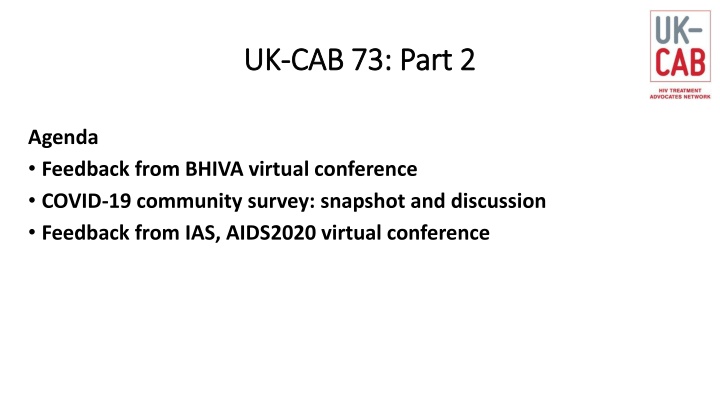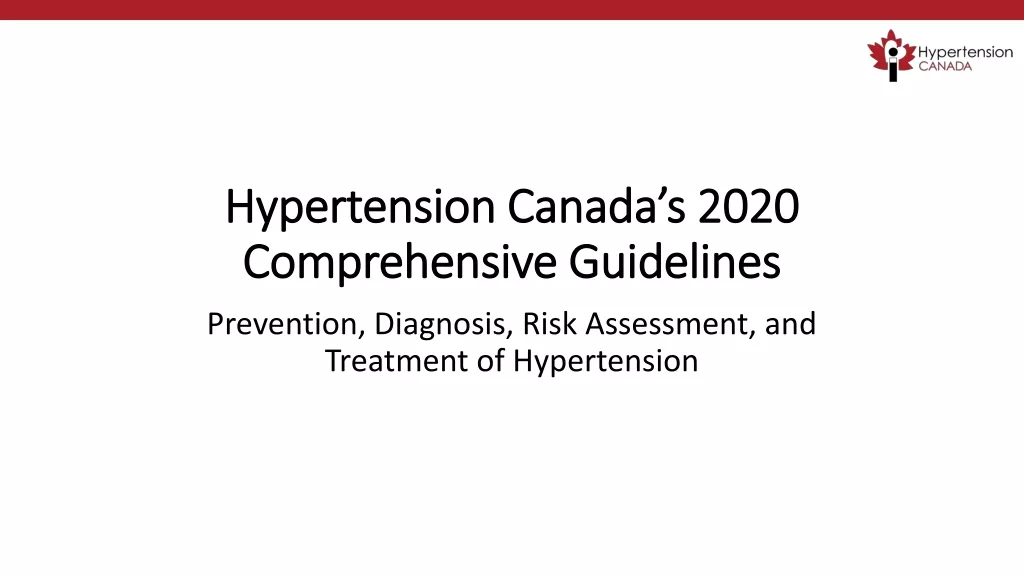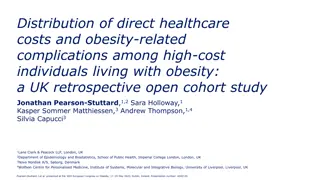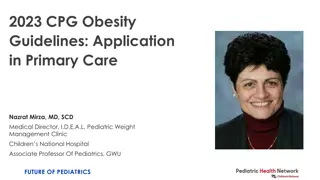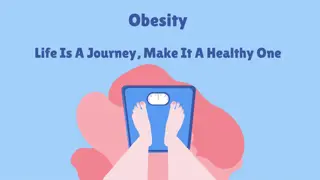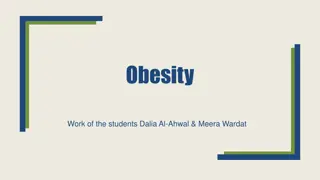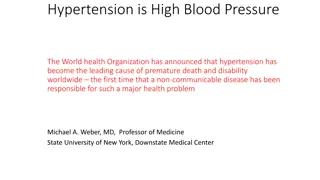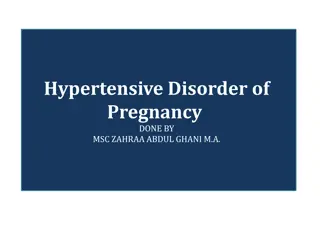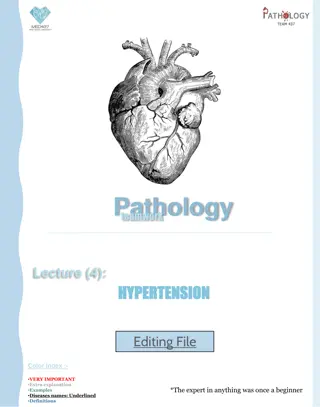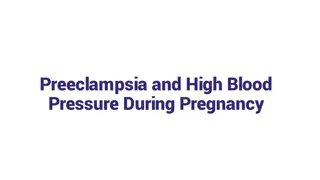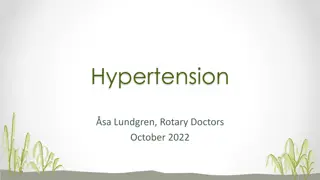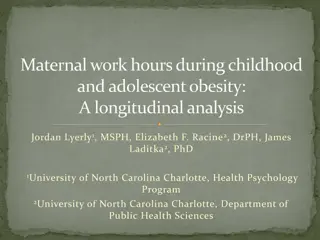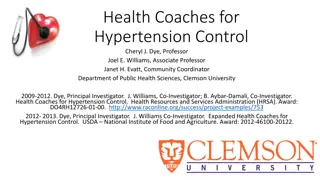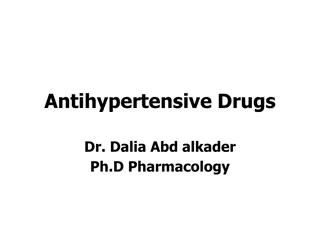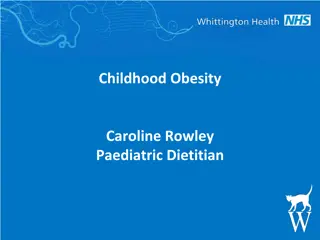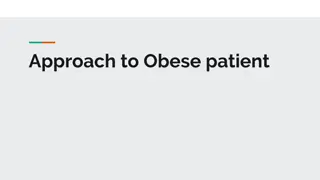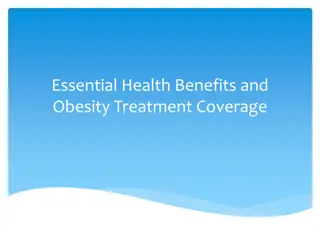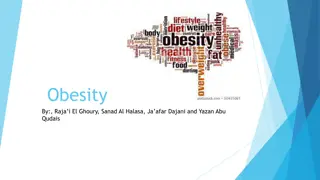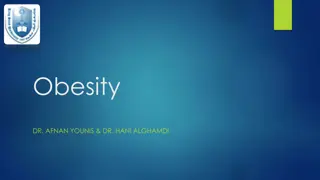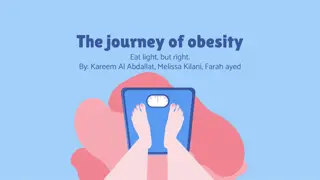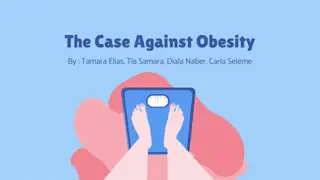Feedback and Updates from Recent Conferences on Obesity and Hypertension
Insights from recent virtual conferences focusing on obesity and hypertension, including expert discussions on the impact of COVID-19. Topics covered include the complex nature of obesity, societal interventions needed, genetic and environmental influences, and strategies for managing hypertension through lifestyle changes. Gain valuable knowledge on weight loss, nutrition, physical activity, and stress reduction in relation to these prevalent health concerns.
Download Presentation

Please find below an Image/Link to download the presentation.
The content on the website is provided AS IS for your information and personal use only. It may not be sold, licensed, or shared on other websites without obtaining consent from the author.If you encounter any issues during the download, it is possible that the publisher has removed the file from their server.
You are allowed to download the files provided on this website for personal or commercial use, subject to the condition that they are used lawfully. All files are the property of their respective owners.
The content on the website is provided AS IS for your information and personal use only. It may not be sold, licensed, or shared on other websites without obtaining consent from the author.
E N D
Presentation Transcript
UK UK- -CAB 73: Part 2 CAB 73: Part 2 Agenda Feedback from BHIVA virtual conference COVID-19 community survey: snapshot and discussion Feedback from IAS, AIDS2020 virtual conference
UK UK- -CAB 73 CAB 73 Feedback from BHIVA Virtual Conference Feedback from BHIVA Virtual Conference Conference programme BHIVA Best of CROI roundup https://fsmevents.com/bhivavc20/bhiva_best_of_croi_roundup_1 BHIVA Plenary Session: HIV and COVID-19 https://player.vimeo.com/video/437147847 Coping with COVID-19: STI, SRH and HIV service delivery in a pandemic https://player.vimeo.com/video/437789524 ViiV symposium: Dovato BHIVA invited lecture: The Brian Gizzard Lecture The science of obesity Hypertension
Obesity Obesity Prof Rachel Prof Rachel Batterham 23 years since WHO declared obesity an epidemic Complex and misunderstood, requiring individual and societal interventions: little has changed Since 2000 defined by BMI Globally in 2016 39% of people were overweight and 13% obese Lifestyle recommendations: Nutrition Activity Behaviour therapy Batterham, UCL , UCL Good news is weight loss improves all of these, however, vast majority of people put weight back on 4-7 years after losing it via a diet
Obesity Obesity Prof Rachel Prof Rachel Batterham Homeostatic signals make sure we eat. But, we mostly eat because of other factors: food is incredibly rewarding; emotional issues; food cues etc. ART can increase body weight by impacting on the regulatory system Gut hormones play an important role largest endocrine organ in the body Humans have a genetic and environmental mismatch: Over 2m years genes have evolved for survival: Conserve energy Allow large food intake Encourage low activity/energy conservation Dieting = starvation/famine this is one of the reasons they fail Studies have shown that naturally slim people have fewer genetic variants known to increase risk of becoming overweight Batterham, UCL , UCL
Hypertension Hypertension Dr Dr Gurvinder Gurvinder Rull Rull, , Barts Barts 12.5m people in the UK (2016) Causes of high blood pressure - Genetic: Polygenetic (check family history) Monogentic Liddle s syndrome (rare) Environmental: Diet e.g. salt Lack of exercise Increased weight and obesity Treatment different if under/over 55. Black African and Caribbean people given same treatment as over 55s Reducing high blood pressure: 5-10kg weight loss Increasing fruit and veg in diet <6g salt per day in diet Regular exercise Moderate alcohol intake Stress reduction something only recently considered
Coping with COVID Coping with COVID- -19 (Impact to Research), 19 (Impact to Research), Prof Chloe Prof Chloe Orkin Orkin, , Barts Barts Conducting research during a pandemic Concerns about bringing people into clinics during a pandemic Overnight, clinical trials went from critical importance to hazardous Clinical colleagues including research staff redeployed to deliver COVID-19 research
Coping with COVID Coping with COVID- -19 (Impact to Research), 19 (Impact to Research), Prof Chloe Prof Chloe Orkin Orkin, , Barts Barts Actions: Proactively contacted trial sponsors FLAIR and LAPTOP were the biggest problem studies: injectable and unwell PLWH Changed medication to oral on FLAIR LAPTOP continued F2F reviews Changed regimens if sponsors would not extend supply for 3 months Withdrew people if commercial supply was available
Coping with COVID Coping with COVID- -19 (Impact to Research), 19 (Impact to Research), Prof Chloe Prof Chloe Orkin Orkin, , Barts Barts Early March: Trial visits How much medication left Next appointments Any medical issues Plan made for each person Skeleton service: One research nurse kept for emergencies and as a POC
Coping with COVID Coping with COVID- -19 (Impact to Research), 19 (Impact to Research), Prof Chloe Prof Chloe Orkin Orkin, , Barts Barts Opportunities for the HIV speciality: Uniquely placed to help with the expertise within HIV field Challenges: Setting up trial governance in setting such as the Nightingale hospitals Important to remember the COVID-19 trials would save lives
Coping with COVID Coping with COVID- -19 (STI, SRH services), 19 (STI, SRH services), Dr John Dr John McSorley McSorley, London North West University Healthcare Trust , London North West University Healthcare Trust BASHH response Open sharing and communications: open access to COVID-19 pages and information Sharing Business Continuity Plans Weekly teleconferences (initially daily for first two weeks of lockdown) Internally BASHH Clinical Governance Committee in close communication Concerns and issues during lockdown We re open, here for you, but phone first messaging required throughout the sector as many people presumed there was zero access to SHS
Coping with COVID Coping with COVID- -19 (STI, SRH services), 19 (STI, SRH services), Dr John Dr John McSorley McSorley, London North West University Healthcare Trust , London North West University Healthcare Trust Temperature check surveys Impact of change: workforce, demand, footfall, telemedicine and distanced care Preservation of essential functions or not Risk assessment and care provision to vulnerable and complex care needs Survey ran during the peak of the pandemic in London, elsewhere in UK slightly behind (~2 weeks)
Coping with COVID Coping with COVID- -19 (STI, SRH services), 19 (STI, SRH services), Dr John Dr John McSorley McSorley, London North West University Healthcare Trust , London North West University Healthcare Trust Second temperature check Shift in activity, most services 15% baseline footfall, now up to 45% (range 10-90%) Online testing and treatment for STIs and enablement for contraception LARC remained suspended BASHH Recovery Principles Consultation and Draft Now published but looked at prioritising vulnerable and complex needs
Coping with COVID Coping with COVID- -19 (STI, SRH services), 19 (STI, SRH services), Dr John Dr John McSorley McSorley, London North West University Healthcare Trust , London North West University Healthcare Trust Second temperature check Shift in activity, most services 15% baseline footfall, now up to 45% (range 10-90%) Online testing and treatment for STIs and enablement for contraception LARC remained suspended BASHH Recovery Principles Consultation and Draft Now published but looked at prioritising vulnerable and complex needs Third sector input via HIV COVID-19 Info Network and BASHH Public Panel
Coping with COVID Coping with COVID- -19 (STI, SRH services), 19 (STI, SRH services), Dr John Dr John McSorley McSorley, London North West University Healthcare Trust , London North West University Healthcare Trust BASHH and PHE agreed complexity/ability matrix Core populations have greater needs not best met by telemedicine Inherent social or psychological issues which prevent telemedicine When restoring F2F access these people come first
Coping with COVID Coping with COVID- -19 (HIV clinical services), 19 (HIV clinical services), Dr Laura Waters, MMC Dr Laura Waters, MMC BHIVA response Dedicated webpage to share information and resources, central location for guidelines and position statements Research: Submitted evidence to APPG enquiry into HIV & COVID-19 Systematic review underway Retrospective analysis of outcomes (ethics pending) Sub-analysis of ISARIC UK-CAB community survey BHIVA/PHE/CHIVA clinic survey
Coping with COVID Coping with COVID- -19 (HIV clinical services), 19 (HIV clinical services), Dr Laura Waters, MMC Dr Laura Waters, MMC Impact on HIV clinical services Move to telemedicine for majority of people Routine monitoring deferred until the next visit - which will be a 1 year gap in monitoring for most Treatment: 1. Longer/advance prescriptions, 2. Expanded postal options, 3. Avoidance of switch
Coping with COVID Coping with COVID- -19 (HIV clinical services), 19 (HIV clinical services), Dr Laura Waters, MMC Dr Laura Waters, MMC Concerns and possible risks Inability to see drug resistance, issues with kidneys and liver etc. Closure of clinics and difficulty contacting all PLWH via telemedicine approach, was pointed out that 27% of 55-64 year olds don t have access to the internet via a smart phone, increasing to 60% of those who are 65+ Missed opportunities to talk about comorbidities, sexual health, domestic violence and other non-HIV specific concerns etc.
Coping with COVID Coping with COVID- -19 (HIV clinical services), 19 (HIV clinical services), Dr Laura Waters, MMC Dr Laura Waters, MMC Challenges vs Opportunities Managing services in an environment of physical distancing By September/October all patients will have missed at least on visit How to measure harm How to ensure good enough is not the new norm How to ensure all patient voices are heard Evidence to amend practice & guidelines Why do you do that? Because we always have?! Experience of new ways of working Especially clinicians! Investment in novel technologies & expedited governance Re-engagement in care, improved adherence Focus on support vulnerable people
Coping with COVID Coping with COVID- -19 (HIV clinical services), 19 (HIV clinical services), Dr Laura Waters, MMC Dr Laura Waters, MMC Old lessons vs Questions for the future The power of non-verbal communication Eye contact Touch Silence Whole body The power of wait here a moment . The power of gut feeling Minimal contact vs accessibility Minimal contact in an era of injectables Clinical trial design Written consent in this day and age?! Technology access Can we ensure nobody is left behind? Monitoring experience How to capture for all?
Coping with COVID Coping with COVID- -19 (HIV clinical services), 19 (HIV clinical services), Dr Laura Waters, MMC Dr Laura Waters, MMC Conclusions COVID-19 has enforced rapid change The NHS can adapt rapidly Future success depends on the 3 Cs: Communication Collaboration Community engagement
COVID COVID- -19 19 The impact on the community The impact on the community Alex Sparrowhawk @SparrowhawkAlex @ukcab UK-CAB Chair
Discussion Discussion (for consideration during this presentation) (for consideration during this presentation) How do we address the unmet needs identified across community-based research and sector-intel? How do we ensure everyone has equity of access to treatment, care and support services post-lockdown? How do we support BAME people living with HIV and others who are vulnerable during the pandemic? What areas of the research do UK-CAB members think are most important to explore further?
Living through a pandemic Living through a pandemic Every part of our lives have been impacted by COVID-19 We have adapted to delivering treatment, care and support services differently Organisations from across the UK supporting people living with HIV have been working together, sharing intel through weekly meetings of the HIV COVID-19 Info Network But what has been the impact on those living with HIV?
UK UK- -CAB community survey for people living CAB community survey for people living with HIV about COVID with HIV about COVID- -19 19 Produced by and for people with HIV with support and guidance from BHIVA. Launched Monday 8 June 2020 and divided into four sections: Part 1: About you, living with HIV and your circumstances since April 2020 Part 2: About COVID-19 symptoms and your healthcare experiences Part 3: About your general health Part 4: Impact of COVID-19 on other aspects of your life Please note: results discussed in this presentation are based on the UK-CAB submission to the APPG on HIV/AIDS Inquiry on HIV and COVID-19. Data retrieved 19.06.2020.
COVID COVID- -19: symptoms and impact 19: symptoms and impact 42% (n=97) advised they had experienced symptoms that could have been COVID-19 since January 2020 2 people advised they were admitted to hospital 25% (n=56) of PLWH advised they were affected by someone close to them being vulnerable to/diagnosed with COVID-19
COVID COVID- -19: access to information 19: access to information Since the start of the UK COVID-19 pandemic, have you been able to access (if and when needed) information about HIV and COVID-19? Yes: 85% (n=187) No: 9% (n=19) N/A: 6% (n=14) Since the start of the UK COVID-19 pandemic, have you been able to access (if and when needed) information about how to protect yourself from COVID-19? Yes: 92% (n=203) No: 4% (n=9) N/A: 4% (n=8)
Impact on treatment and care Impact on treatment and care PLWH were asked about their treatment and care experiences since the start of the pandemic. Where applicable they advised the following were more difficult than before : Attending a routine appointment with your HIV doctor (which may have been replaced by a telephone appointment) : 42% (n=61) Making a new (unplanned) appointment with your HIV doctor : 49% (n=35) Receiving your HIV medication (including home delivery) : 20% (n=32) Taking HIV treatment : 6% (n=12) Getting support from HIV community organisations : 23% (n=26).
Impact on treatment and care: changes to Impact on treatment and care: changes to appointments appointments 20% (n=31) of PLWH with appointments scheduled since the start of the pandemic had them cancelled 72% (n=111) had their appointment replaced with an alternative (e.g. telephone appointment) 83% (n=85) of 102 PLWH expecting other (non-HIV) health scans and tests had these cancelled as a result of the pandemic
Impact on treatment and care: future Impact on treatment and care: future considerations considerations 9% (n=20) of PLWH would not feel comfortable talking to their HIV doctor via telephone from where they are currently living Eight people (4%) do not believe they have enough available data, and/or digital devices, to make contact effectively with HIV clinical and support services remotely
Impact to financial situation and employment Impact to financial situation and employment When asked about changes to their working or volunteering situation: 25%(n=56) advised their situation didn t change (they do not work or volunteer) 18% (n=40) said their situation did not change (work or volunteering continued as before) 16% (n=36) were furloughed 7% (n=15) had their hours or salary reduced 2% (n=4) lost their job 4% (n=9) had their volunteering role was suspended.
Impact to financial situation and employment Impact to financial situation and employment 58% (n=130) advised they had an annual income of 25,000 or less: 55/130 annual income was 10,000 or less 86% (n=197) said they had enough income prior to lockdown. 21% (n=48) advised this changed after lockdown
Impact to financial situation and employment Impact to financial situation and employment Since the start of the UK COVID-19 pandemic, have you been able to access (if and when needed) advice on employment, housing, benefits, legal, immigration? Yes: 14% (n=30) No: 15% (n=32) N/A: 72% (n=156) Since the start of the UK COVID-19 pandemic, have you been able to access (if and when needed) help getting food (e.g. when shielding, food bank)? Yes: 26% (n=58) No: 16% (n=36) N/A: 57% (n=126) Since the start of the UK COVID-19 pandemic, have you been able to access (if and when needed) social security or other welfare benefits? Yes: 18% (n=39) No: 17% (n=38) N/A: 65% (n=142)
Impact on mental wellbeing Impact on mental wellbeing We asked if during lockdown, or as a result of COVID-19, PLWH felt unhappy or depressed: 12% (n=26) advised Not at all 28%(n=62) no more than usual 38%(n=83) more than usual 22%(n=48) much more than usual . Since the start of the UK COVID-19 pandemic, have you been able to access (if and when needed) counselling for stress and anxiety? Yes: 19% (n=41) No: 24% (n=52) N/A: 58% (n=126)
Impact on mental wellbeing: HIV status and Impact on mental wellbeing: HIV status and ethnicity ethnicity We asked PLWH if they were worried or felt stressed about COVID-19 due to their HIV status: 56%(n=124) of all respondents said Yes 66%(n=21) of BAME respondents said Yes We asked if respondents were worried or felt stressed about COVID-19 due to their ethnicity: Two-thirdsof BAME respondents (66%, n=21) said Yes Four people of white ethnicities also responded Yes to this question one of them incorrectly stating COVID affects everyone the same
Looking ahead Looking ahead The full impact, including the economic consequences of the global pandemic are yet to be experienced Unknown impact on spending for the NHS, public health and support services These findings provide a snapshot of some of the concerns people living with HIV have experienced in the past few months. However, they re not representative of everyone, and likely do not characterise all of those who are most vulnerable Many people will adapt to new methods of receiving support and care, changes to their personal circumstances and post-lockdown living Underserved communities are likely to remain the most vulnerable: the pandemic represents an opportunity for all of us to address health disparities
Discussion (reminder) Discussion (reminder) How do we address the unmet needs identified across community-based research and sector-intel? How do we ensure everyone has equity of access to treatment, care and support services post-lockdown? How do we support BAME people living with HIV and others who are vulnerable during the pandemic? What areas of the research do UK-CAB members think are most important to explore further?
